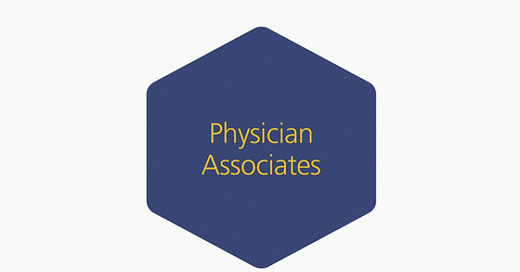Our journey as an organisation began with physician associates. Mo was a lecturer in physician associate studies, and as a physician associate myself, I have always been passionate about the role.
I qualified at a time when jobs were plentiful. Students had positions lined up before graduating, and we often had to turn down interviews simply because there were so many opportunities available. The government provided funding to both primary and secondary care settings to support the employment of physician associates. At the time, it felt as though the world was our oyster.
Things are very different now. Royal colleges are calling for a review of our role, unions are opposing us, and the NHS has largely paused hiring. For those of us who invested thousands in our degrees with the aim of helping patients, this is an all-time low. Job openings are trickling through, and each one attracts hundreds of applications. Many of those who are employed are working as healthcare assistants (HCAs), despite being overqualified for the role.
Among the physician associates who remain employed, we've learned through speaking with hundreds that their roles have been downgraded. The media backlash, statements from royal colleges, and criticism from clinicians on platforms like Twitter have pressured some employers to either make PAs redundant or reduce the scope of their roles.
Turbulence was to be expected…
The NHS has undergone dramatic changes over the past few decades, and the introduction of physician associates is one of them. The reality of being spoilt for jobs, as I described earlier, was a false one. We were fewer in number, doctors were spread across roles, and at the time, there were no major concerns about patient safety or scope creep.
What we are experiencing now is the norm. We represent a “different way of doing things,” and given the current socioeconomic climate, we’ve become an easy target for blame. Jobs across the NHS are scarce, junior doctors are underpaid, and cuts are happening across the board. The frustration is understandable. Whether it’s ACPs, ANPs, optometrists, or reporting radiographers—similar tensions have arisen before, only to eventually settle.
Amid all this negativity, there are still some positives, and it’s vital that we focus on them.
GMC Regulation – This is a major milestone, as thousands of PAs join the register and PA courses across the country are assessed under a recognised framework. We will see the emergence of rigorous standards for exams and continuing professional development (CPD) for qualified PAs. This will help build public confidence and further establish the PA profession.
Leng Review – We should welcome the Leng Review as a formal process of evaluating the role of PAs. Members of the appointed committee have been engaging with Trusts and ICBs, gathering input from clinicians and managerial staff. The review is expected to conclude in late summer. We anticipate positive findings, which should once again boost employers' confidence in the PA role.
International Recognition – New Zealand’s Minister of Health, Simeon Brown, recently announced that the government will regulate and formally recognise physician associates. This development follows the GMC’s regulation of PAs in the UK. We expect other countries to follow suit, potentially opening up exciting opportunities for PAs around the world.
Many of these factors are outside our control, but they point towards a very positive trajectory. As physician associates, we must continue to challenge outdated perceptions about our role and competency. It’s vital that we set a positive example for PAs across the UK. Here are some important actions you can take:
Stay informed – Keep up to date with developments and support petitions that advocate for greater recognition of physician associates. Don’t worry — we’ll also keep you updated as things progress!
Register with the GMC – We strongly suspect this will become a requirement for future roles. We understand this can be financially difficult if you’re currently unemployed, but try not to delay it too long.
Seek employment in a healthcare-related field – Even if it’s not your ideal role, staying connected to clinical practice keeps your skills sharp and helps build a valuable network. It also gives you real-world examples to draw on in future interviews.
Keep developing your portfolio – Prepare yourself for future PA roles by continuing your professional development. There are plenty of free opportunities available, including our weekly webinars. These will help you stay up to date in key practice areas and provide certificates to document your learning.
Finally, what can you expect from Pareto Education?
We’ve given this a lot of thought, as we've been part of the journey for hundreds of physician associate students across the country. In summary:
We promise to continue advocating for physician associates.
We promise to keep developing high-quality resources to support you on your journey.
We promise to remain open and approachable for any questions you may have.
If you have any questions about anything mentioned above, simply comment or email us with your queries!
CPD Dermatology Masterclass
Join us for 3-hour course boosting your confidence in diagnosing and treating dermatological conditions. This course will provide examples of skin lesions on people of varying skin tones. We will cover:
• Atopic, fungal and inflammatory skin disorders
• Difficult to treat disorders: Acne, psoriasis, rosacea & more
• Steroid, Emollients and specialist treatments
• Cancers and pre-cancerous lesions: BCC, SCC, melanoma and more
Join us LIVE (18/05/2025) or watch the RECORDING later.
This course is externally accredited for CPD. Students and professionals welcome. You can book here.
Website: www.paretoeducation.co.uk
Instagram: www.instagram.com/pareto_ed
Twitter: www.twitter.com/pareto_ed
Youtube: https://bit.ly/3DPm23c
Email: info@paretoeducation.co.uk







Nothing positive about this situation. It's okay to preach to the jobless and massively indebt to focus on the good. You're able to feel that as you clearly have jobs. I want my money back, fed up of fighting for this.